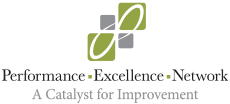
Moving from Checkers to Chess: 7 Strategies for Leaders to Navigate Today’s Chaos – February 2025
February 25, 2025
Sometimes the topic for my newsletter article just comes to me. Last week I ran across a podcast (and companion newsletter) published by Jo Saxton, a nationally known speaker, author, and leadership coach. Before I share a portion of it, let me start by saying my column is not about politics — everything PEN does is non-partisan, non-political. But it is about leadership — it’s about finding ways to better navigate today’s increasing challenges and growing uncertainty. It’s about performing despite increasingly difficult circumstances. Maybe I’ve piqued your curiosity…
There’s a lot going on in our environment. A lot. The early actions of the new administration are causing significant changes to our businesses, our nonprofits, our governmental agencies, and our communities. Just scan some of the headlines:
- the federal budget freeze (as well as full and partial federal agency cuts) are not only impacting governmental services that we all use at a local level, but they are beginning to impact the performance of all sizes and types of organizations — those that rely on government funding, loans, and/or services to execute their mission or deliver their own services and programs;
- the on-again-off-again tariffs are putting strain on any business or organization that relies on foreign suppliers; one PEN member has frozen all of their discretionary budget, as 70% of their raw materials come from Canada, which — if that tariff goes into effect — would obviously erode (if not destroy) their profitability;
- the intensifying focus on undocumented immigrants is beginning to stretch the capacity of an already stressed US workforce;
- the rollback of DEI efforts is undoing years (in some cases decades) of progress in building more inclusive workplace cultures — of understanding and building better relationships with diverse marketplaces.

I could probably go on. It’s not clear to me how many of these changes will be “good,” “bad,” or somewhere in between. But they are massive changes — shifts in how we live and work. And — just given the pace, the magnitude, and the ever-shifting directives — they are causing considerable uncertainty for leaders within our organizations. In many ways, it reminds me a lot of the early days of COVID-19, where we really didn’t know what the next day would bring. There’s chaos; there’s increasing levels of ambiguity; there are growing levels of risk. It’s impacting every type of organization from businesses to schools to healthcare systems to nonprofits and governmental agencies (if your organization hasn’t yet felt the changes, you likely will).
But leaders still have organizations to run: we still have customers to serve and workers that need support to be effective and successful in doing their work. We still have strategies to execute, goals to achieve, outcomes to produce.

Saxton’s February 6 podcast starts with a clever opening line: “Well, January was a long year, wasn’t it?” That was three weeks ago. Now that we’re at the end of February, I suppose 2025 feels like a decade for some. Saxton goes on to share that she’s been thinking about how to navigate today’s landscape and that she was reminded of a line from a book: “Don’t play checkers when the game they’re playing is chess.” An excerpt from her piece:
“I do feel played by the volatility and reactivity on social media and by the barrage of news soundbites that can be loud, divisive, chaotic and disorienting. It makes me angry, frustrated, antagonistic, sad. Before I know it, I’m irritated and distracted and doomscrolling; either checking out of it all (‘I don’t do politics’), or getting addicted to checking in while feeling anxious and powerless. And that really is intended. Clickbait or checkmate?
“Still, as the world I’m in spins off its axis, the last thing it feels like is a game.
Refugee resettlement is not a game, especially for families who are now vulnerable after protecting US interests in dangerous places. DEI rollbacks are not a game. Chaotic leadership is not a game. Unchecked and unaccountable power is not a game. And they’re not accidental, sudden moves either. They’ve been building for a long time.
“How do I respond, navigate, lead through this time?
“Checkers? In this context, checkers for me is a picture of a clearer, simpler game. A simpler task at hand. It’s one move at a time, one reaction at a time, with the same intensity. When I apply it to leadership, to my life it’s as if I’m making familiar moves, fast paced reactions based on a world that existed pre pandemic, or even two or three years ago, I’m leading through a different leadership lens. And while checkers may have worked once, the world is a different place. 2025 is a different place.
“Chess? Chess is a different game, a complex game. Different pieces doing different things in different ways. Strategies that, at first glance, appear simple and straightforward, but actually they’re lethal. Chess plays a patient and intentional, long game. It looks at a bigger picture, determining moves that will ultimately be unstoppable.
“Can I identify the chess games being played in my life, in my leadership spheres and in the world in which I live and work? Or am I exhausting myself primarily because I’m still playing checkers?
“To be honest I’m still working on this. I’m very much a work in progress.”
Aren’t we all, especially when it seems like the rules of whatever game it is we’re playing change by the day. But her podcast did get me thinking: some of the best practices in leadership that apply during normal, “peaceful” times become even more important during these highly uncertain and chaotic ones. So here are some tips for us as leaders in navigating today’s new game — today’s rapidly changing new environment – the first one is Saxton’s:
Focus on what’s truly important – When everything is changing, remember the things that aren’t — or shouldn’t be — those foundational statements like your organization’s mission, vision, and core values. Keep in mind your strategies (though they may need to shift to address environmental shifts), your employees’ needs, your customers’ needs. These fundamentals become more critical when making decisions — they help you stay centered on what is “key,” what is core, and what is truly important. Focus, as Saxton says, on the long game, not the day-to-day gyrations: “learn to discern what’s important and what’s not — don’t get sucked into the trivial swirl around us.” Stay grounded.
Communicate, communicate, communicate – As leaders, communication with our teams is always important, but during times of crisis, it becomes absolutely critical. Our employees want answers — or at least they want updates. Be thoughtful in your messaging; use data and facts, not emotions or conjecture; be honest and say what you know (or admit what you don’t); be authentic; stay non-political (everyone has an opinion and all of them are valid). And communicate frequently — more than you think you need to.
Listen, listen, listen – listen to your people to understand how they’re feeling; listen to your customers to see how their environment is also shifting; listen to other leaders from other organizations, exploring to discover solutions from outside your four walls that could be innovative to your situation. When the world is shifting so quickly, you don’t have all the answers. But if you listen, you may find some of them.

Shift your planning process – I mentioned this (several times) during COVID: the process of strategic planning is changing. Gone are the days that you can create a three- or five-year plan and then take your time in implementing it. COVID taught us that we had to shift gears frequently and rapidly (I think that’s where we started using the word “pivot” so often!). But even before COVID — with technology, market shifts, and other factors — the accelerating pace of change requires us increasingly to set a long-term vision while creating shorter-term, more flexible action plans. Think annual plans; think 90-day plans; think weekly plans. You should still have that long-range view of where you want to go but build agility into your planning process so you can have more rapid, more effective response. Today, you may need to focus more on scenarios (“if this happens, we do that; but if that happens, we need to do this”). During times of increasing change, planning is critical. But you may have to use a different planning approach to be more responsive to the environment.
Focus on (reliable) data – Better leaders always use data to make decisions: fact-based decisions are more sound and likely to lead to better outcomes. Especially today, when so much is swirling around us — and some of it may conjure up emotional responses, regardless of which way you lean — putting aside your opinions and your beliefs and focusing on (factual) information can help you sort through the chaos, finding truth over noise. Don’t believe everything you read and hear; consider reputable and independent sources. And stay curious: focus on the questions, not just the answers.
Take care of yourself – As they say when you’re taking off in a plane (maybe not a great metaphor these days): take care of yourself before you take care of others: if you pass out from oxygen deprivation, you’re not useful to anyone else who needs your help! Dig deep; stay resilient; invest in your own personal well-being — spiritual, emotional, and physical. Yes, exercise, eat well, rest and sleep, do things you enjoy, spend time with people you love. Get off social media and go outdoors sometimes; get some fresh air and take in nature. Take vacations — or even personal sanity days. Refill your tank. You need energy to navigate through crisis; this may be a marathon not a sprint.
Show empathy and civility – Finally, have a heart. We’ve all been through a lot the last few years, and now we’re adding in some additional layers of complexity and stress. I personally think our challenges will increase before they subside, which means many of us will be stretched and tested in many ways — your team, your customers, your suppliers and partners, even your family and friends. Remember the importance of sensitivity — of empathy. Put yourself in others’ shoes, not just during crisis but all the time. Don’t make assumptions, other than to assume positive intent. Give your fellow humans a break.

It’s always a challenge for leaders to lead organizations — there are just so many moving parts, so many competing priorities, so much complexity in the system. But today, sustaining your organization’s mission — heck, just continuing to operate (let alone trying to actually thrive), leaders need to reground themselves in leadership best practices. As John Shedd once said: “A ship in a harbor is safe, but that’s not what ships are built for” — have some courage, keep focused on what’s important, be persistent and resilient, take deep breaths, and try to look a few moves ahead in this proverbial game of chess we’re all now in.
What other insights do you have regarding how to lead during challenging times? Participate in a discussion on this topic: visit our LinkedIn group to post a comment (and follow me on Twitter @LassiterBrian!).
Never stop improving!
Brian S. Lassiter
President, Performance Excellence Network
www.performanceexcellencenetwork.org
A Catalyst for Success Since 1987!
Photo credits Adobe Stock

